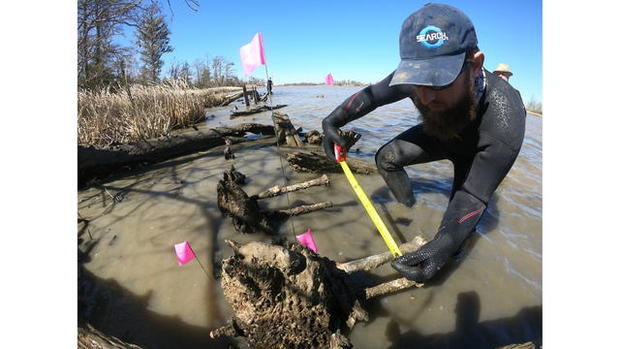Wreckage not last ship to bring slaves to United States, investigation finds
MOBILE, Ala. -- Investigators have determined that an old wooden wreck found on the Alabama Gulf Coast isn't the last slave ship to land in the United States, the Alabama Historical Commission said Monday. A statement released by the state agency said the ship remains found north of Mobile are too large and new to be those of the Clotilda, which was burned nearly 160 years ago after delivering captives from what's now the west African nation of Benin to Mobile in 1860.
A reporter found ship remains on a river bottom during an unusually low tide in January and published an article, prompting a historical review.
Even though the remains are not the Clotilda, the discovery shows the need for a wider study of shipwrecks on the coast, said James P. Delgado, a senior vice president of SEARCH, Inc., which participated in the examination.
"We believe that a comprehensive survey of the area with a range of modern technology, followed by an examination of each wreck encountered by knowledgeable professionals will be the best means to find the physical remains of Clotilda," Delgado said in the statement.
The team was composed of experts from SEARCH, National Park Service, Slave Wrecks Project and the University of West Florida who examined and documented site at the request of and under the supervision of the Alabama Historical Commission, CBS affiliate WKRG-TV reports.
You can read the press release in its entirety below:
State and federal experts who examined the wreck recently said the ship in the mud was about 160 feet (50 meters) long, while the Clotilda was 86 feet (25 meters) long. Also, the wreck had three masts, while the Clotilda had two.
The wreck in the Mobile-Tensaw Delta had what appeared to be marks indicating fire damage, but the review showed those marks actually were caused by wood-eating marine organisms, the statement said.
Also, the construction methods used on the wreck didn't become common until after the Clotilda was built, and the wreck didn't appear to include oak, which was used on the slave ship.
The Clotilda sailed to Africa on a bet by an Alabama steamboat captain and plantation owner who wanted to show he could sneak slaves into the country despite federal troops stationed at forts that guarded the mouth of Mobile Bay.
The ship delivered 110 captives to Mobile in the last known instance of a slave ship landing in the United States. The captain took the ship up the delta and burned it; the people became slaves, and they and their descendants lived after the Civil War in an area near Mobile known as Africatown.






